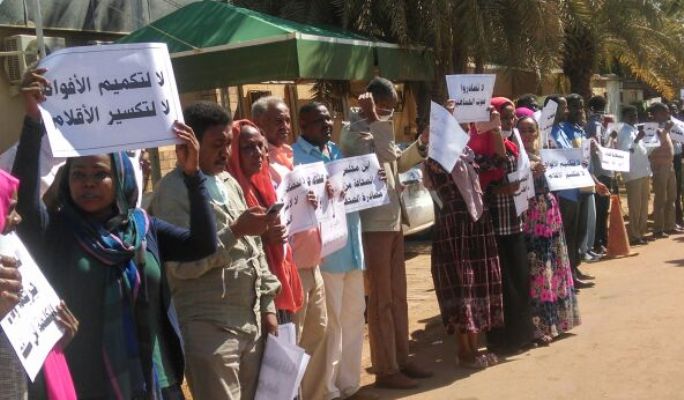U.S. denounce arbitrary detention of Sudanese journalists

January 20, 2018 (KHARTOUM) – The United States has condemned Sudan’s arbitrary detention of a number of journalists during the ongoing wave of anti-austerity protests.
The National Intelligence and Security Services (NISS) arrested 15 journalists for covering two protests on 16 and 17 January in Khartoum and Omdurman towns.
They arbitrary arrest was seen as an attempt form the security apparatus to dissuade the independent local media and international correspondents from covering protests organised by the opposition parties and advertise their activities.
“We are aware of the detentions and are closely following the reports,” U.S. State Department spokeswoman Heather Nauert told Agence France Presse (AFP) on Friday
“We condemn the harassment, arbitrary detention and attacks on journalists in Sudan who are doing their jobs and exercising their fundamental right to freedom of expression” she added
Nauert further expressed deep concern “about freedom of expression, including for members of the media, the closing of political space for all Sudanese, and Sudan’s poor overall human rights record”.
“We continue to press Sudan to improve its performance in these areas, and to ensure that those detained are treated humanely and fairly… and that they are allowed access to legal counsel and their families” she added
According to the Paris-based media watchdog Reporters Without Borders (RWB) on Friday, eight journalists are still in arrest citing Reuters reporter Khalid Abdel Aziz and AFP reporter Abdel Moneim Abu Idriss in addition to Shawky Abdelazim, journalist at the independent daily Al-Youm Al-Tali, Imtinan El Radi, a reporter for the same newspaper, and Hayder Ahmed Khair Alla of the daily Al-Jareeda.
Also, among the detainees Amal Habani, a female reporter for Al-Taghyeer news website. She was awarded an Amnesty International prize for her human rights work in Sudan.
Last October, Washington removed economic sanctions on Sudan within a five-track engagement reached in December 2016, including the cessation of hostilities in the conflict areas, the humanitarian access to civilians in the war zones, cooperation to address regional conflicts and the support of U.S. counterterrorism efforts.
The framework, also, includes three matters added in July last year including human rights record, religious freedoms and Sudan’s commitment to the international sanctions on North Korea which tops Washington diplomatic priorities.
The lift of sanctions should be followed by talks on the lift of remaining sanctions, the end of armed conflicts and democratic reforms in Sudan.
Washington said it would use the removal of remaining sanctions to encourage the government of President Omer al-Bashir to achieve peace and restore freedoms.
(ST)
